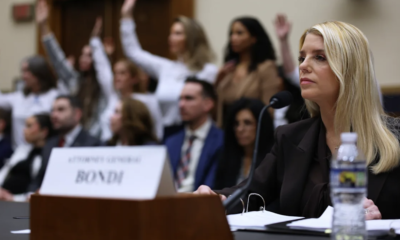Copyright
Trump Faces Copyright Lawsuit Over Use of Isaac Hayes’ Song at Rallies
A federal judge has ruled that former President Donald Trump must face a copyright lawsuit filed by the estate of Isaac Hayes over the alleged unauthorized use of the 1966 soul classic “Hold On, I’m Coming” at campaign events.
Judge Thomas Thrash Jr. denied Donald Trump’s request to dismiss the case, stating that while the Isaac Hayes estate’s complaint had issues, it still contained sufficient evidence to move forward. “I think that the second amended complaint — in spite of all its problems, and there are quite a few — adequately alleges ownership of the work,” Judge Thrash said during a court hearing on April 2, 2025.
Trump’s Legal Defense Falls Short
Donald Trump’s legal team had argued that the Isaac Hayes estate failed to prove it owned the rights to “Hold On, I’m Coming,” which was originally written by Isaac Hayes and David Porter and performed by Sam & Dave. They further claimed that the campaign’s use of the song did not constitute copyright infringement and that the case lacked merit.
However, Judge Thrash rejected these claims, allowing the lawsuit to proceed. Brittney Dobbins, an attorney representing the Isaac Hayes estate, welcomed the ruling. “We are pleased with today’s decision. The judge made the right call. Now, we are prepared to litigate this case on the merits,” she said.
Copyright and Trademark Claims Against Trump
The Isaac Hayes estate filed the lawsuit in summer 2024, accusing Donald Trump’s campaign of not only violating copyright laws but also federal trademark laws. According to the complaint, Trump’s repeated use of the song in campaign rallies and promotional videos gave the impression that Hayes’ estate endorsed Trump’s re-election bid.
This case is part of a larger trend of artists opposing Trump’s use of their music during political events. Over the past year, several high-profile musicians and their estates—including Beyoncé, Celine Dion, ABBA, and the Foo Fighters—have publicly objected to their songs being played at Trump rallies. Some issued cease-and-desist letters, while others took legal action.
The White Stripes also sued Trump for using their hit song “Seven Nation Army” without permission. However, the band voluntarily dropped the case after Trump won the 2024 election.
The Political Battle Over Music Rights
The lawsuit against Donald Trump raises broader questions about the unauthorized use of music in political campaigns. Artists and record labels frequently object when politicians use their songs without consent, arguing that it misrepresents their views and violates their intellectual property rights.
Historically, copyright law has made it difficult for artists to prevent politicians from using their music, as music licensing organizations like ASCAP and BMI often control public performance rights. However, this case could set a precedent if the Isaac Hayes estate succeeds in proving that Donald Trump’s campaign misused the song in a way that misled the public.
With the lawsuit moving forward, Trump’s legal team will now have to mount a defence against claims that his campaign improperly used a legendary soul anthem to promote his political agenda. The outcome could impact how future political campaigns handle copyrighted music—and whether artists have a stronger say in who gets to use their work.










































Pingback: China’s Trolled Trump with 34% Tariff: Trump’s 34 Felony Count?